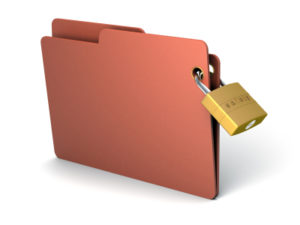Hello and welcome to the 5th installment of my Q & A series, which is designed to cover some of the more elusive topics associated with the Social Security Disability claims process. In this post, I answer a question regarding the confidentiality of a Social Security Disability claimant’s medical records.
Question:
I recently received a denial following my initial disability application. I would like to review all of the evidence, both medical and other, that was considered in determining my claim. Is this a possibility? Further, is this information available to the public for review and dissemination? In essence, what rules govern confidentiality of SSA disability records?
My answer:
To begin with, I am here to tell you that you can feel at ease about your SSA records. Any information that was provided by you, as well as any additional information obtained by the SSA that is part of your claim, is protected under the Privacy Act, one of two separate and distinct laws that govern Federal agencies.
Under the Freedom of Information Act (FOIA), Federal agencies are required to provide the public with access to their files and records. However, this particular Act (FOIA) is not applicable to records maintained by the SSA. The second law, the Privacy Act, governs records such as medical evidence and other supporting documents retained by the SSA during your claim. The Privacy Act permits you only or your designated representative the opportunity to examine all records pertaining to you. This means that you may request to review all the medical documentation or other evidence that was used to evaluate your claim for disability. While you and/or your representative are provided with this opportunity, members of the public are not. Simply stated, your information is not available to the public for any type of review or dissemination.
may request to review all the medical documentation or other evidence that was used to evaluate your claim for disability. While you and/or your representative are provided with this opportunity, members of the public are not. Simply stated, your information is not available to the public for any type of review or dissemination.
It is important to note, however, that the SSA does reserve the right to determine whether the release of information could potentially have an adverse effect on you. If it is determined that the potential negative effects outweigh any probative value, the information requested will only be released to your authorized representative, that individual you designated in your initial application or later in writing. This is rare, however, and only applies in extreme circumstances.
One final note: Now that the SSA has converted most it’s disability case files into electronic format, it is likely that you will be sent a CD containing your information/records once you request access to your records. Here at my  practice, we receive CDs containing our clients’ case files a few weeks or months prior to the hearing. We are now able to see everything in our clients’ files just by referring to the CD, and this is saving us from having to finger through large files to find what we need! Hopefully you will find this convenient as well, in the event that you end up requesting that SSA furnish you with your claim records.
practice, we receive CDs containing our clients’ case files a few weeks or months prior to the hearing. We are now able to see everything in our clients’ files just by referring to the CD, and this is saving us from having to finger through large files to find what we need! Hopefully you will find this convenient as well, in the event that you end up requesting that SSA furnish you with your claim records.
The CD format for managing medical records is intended as a stopgap until SSA manages to establish a secure online system that attorneys and perhaps even claimants can use to access their claims files online. Currently Social Security judges have access to records online but not attorneys. In my view the CD format is probably less secure than the old paper format because claimants, attorneys and even Social Security personnel tend to get sloppy about leaving CD’s lying around. Almost every time I appear at a hearing office, I will see CD’s containing someone else’s personal medical records, Social Security numbers and Social Security claims file lying around. If your file is on on CD, make sure to verify after your hearing your lawyer removes the CD from the hearing room computer.
Happy Friday, be sure to tune in next week for Installment 6 of my Q & A Series.
can ssdi acsess my private medical records during a ssa-455 ocr -sm review ive been on ssdi for 5 years andif they can is it a regular routine thanks
Social Security needs a medical authorization before they can obtain any of your medical records. However, if you refuse to sign an authorization and they conduct a continuing disability review, the absence of records and your refusal to authorize a release of records can be used as a basis for terminating your benefits.
Hello,
If, as a taxpayer, I am paying for a person’s disability, why can’t I know who is being paid that disability (in other words, why can’t names of recipients be made public if the public is paying)?
Personal information about Social Security disability recipients is protected by a variety of federal privacy rules.
I recieved SS Disability abt a year ago. After a nasty altercation w/his ex, my boyfriend was confronted with extremely personal & private info abt me. It turned out to be my ss file she’d searched for online, found, printed out. Not only is my SS file online for ANYONE to see, but it’s there in it’s entirety-medical records, drs, meds, and of course all the embarrassing info, episodes, & claims which finally granted me my disability. I searched for it myself and it is indeed there. All i did was type my name and “social security.” I suffer from Bipolar Disorder so this is extrhumiliating, considering manic episodes, suicide attempts, etc. HOW THE HECK IS THIS POSSIBLE, & what, if anything, can i do???